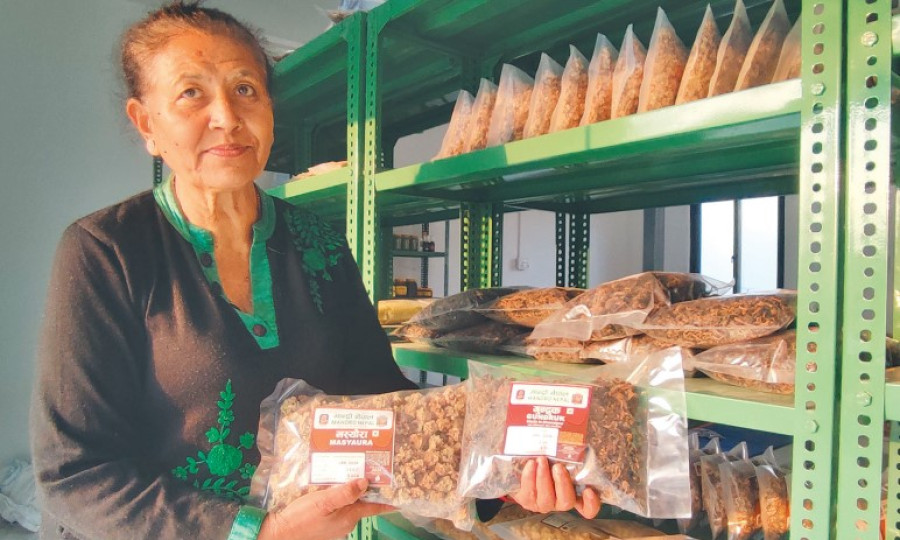Money
Nepal moves to recognise masyaura as trade prospects grow
Quality Determining Committee is awaiting response from World Trade Organisation on the draft standards containing sanitary and phytosanitary details.
Post Report
Nepal’s quality watchdog has proposed new quality standards for masyaura to give it recognition in line with international standards.
The fermented sun-dried vegetable balls are made with a combination of various or single minced vegetables with black lentils.
Traditionally, in most of Nepal’s villages, masyaura serves as an alternative nutritious food item as fresh vegetables aren’t available around the year.
The Quality Determining Committee formed under Nepal’s Food Act has sent the draft standards to notify the World Trade Organisation (WTO) about the product’s sanitary and phytosanitary details to ensure that the food is safe to eat, officials said.
The Agreement on the Application of Sanitary and Phytosanitary Measures sets out the basic rules on food safety and animal and plant health standards that governments are required to follow.
Together with the Technical Barriers to Trade Agreement, it seeks to identify how to meet the need to apply standards while avoiding disguised protectionism.
If the WTO is satisfied with the new standards, the department will implement them by publishing them in the Nepal Gazette, said the Department of Food Technology and Quality Control.
It will take at least 90 days to get a response.
It has been nearly two months since the department sent the draft to the WTO.
“With increased commercial production and consumption of masyaura in urban areas, along with a rise in exports, the new standard has been prepared,” said Mohan Krishna Maharjan, chief of Sanitary and Phytosanitary Measures National Enquiry Point under the Department of Food Technology and Quality Control.
The new standards will be helpful in regulating the quality of masyaura and also define its hygiene merits, he said.
“We have not received any response from the WTO yet. If they write any comments, we need to revise the standards accordingly,” said Maharjan.
Once the Sanitary and Phytosanitary Measures are adopted, producers who fail to adhere to the standards will be fined under the Food Act, said Maharjan. The fine, currently under the act is Rs50,000 or up to five years of imprisonment, said Maharjan.
According to the proposed standards, masyaura is fermented sun-dried or mechanical-dried vegetable balls made with a combination of minced black lentils, yam and taro plants.
Masyaura should not contain grains, soybeans, or any other food items in its preparation. It should be dry, clean and free from damage by insects, decay or moisture.
Also, masyaura should not be laced with any inorganic or harmful products during its preparation.
The inorganic external matter includes stones, sand, glass, plastic or its fragments, including the pieces of mud, iron or other inconsumable products.Masyaura should not be prepared by using external colours, fragrance or class II of preservatives.
The moisture percentage should be at least 11 percent with total ash should be 4 percent on a dry weight basis, according to the standards.
The ash content in food refers to the minerals and inorganics left after the food sample has been heated to a very high temperature removing moisture, volatiles, and organics.
The dilute hydrochloric acid insoluble maximum level should be 0.15 percent on a dry weight basis. Maximum total protein should be 15 percent on a dry weight basis.
The contaminants, toxins and residues should be as determined by the government. Likewise, the production, packaging, handling, storage and transportation of masyaura should be as determined by the Ministry of Agriculture and Livestock Development.
The packaging material used for the packing of masyaura should be clean, dry and of food grade with proper labelling as determined by the Food Regulations.
The label should clearly list out the ingredients used in preparing masyaura.
Nepali traditional food items like masyaura are gaining popularity among the Nepali diaspora.
Many people have been sending or taking masyaura as gifts for their relatives abroad.
Traditional fermented foods have been deeply ingrained in the Nepali culture since early history.
According to a research paper, fermentation evolved as a preservation or prevention technique during lean periods to counter spoilage of food products. It is one of the oldest and most economical methods for producing and preserving foods.
In addition to preservation, fermented foods can also enhance flavour, increase digestibility, and improve nutritional and pharmacological values.
Lactic acid bacteria perform an essential role in the preservation and production of wholesome fermented foods.
Recently, the Cabinet passed the quality standards for rolled oats and set maximum limits on trans fat on foods sold in the market.




 13.12°C Kathmandu
13.12°C Kathmandu












